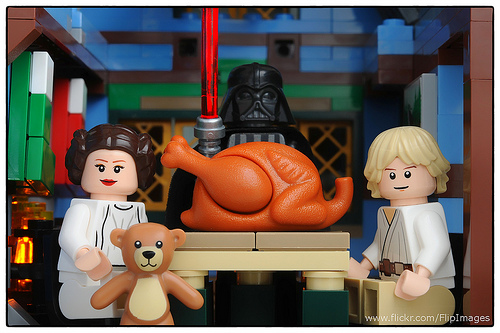Lessons from a ‘Galaxy Far, Far Away’ Echo Gospel Teachings
The parable of the prodigal son in the gospel of Luke is about a father who loses his son but selflessly waits for him to return. Star Wars is about a son named Luke who selflessly seeks to rescue a prodigal father. Fans often focus on the individual characters but what truly moves us is the relationships between them—husband and wife, brother and sister, father and son. Star Wars is about the power and importance of family, and family is the center of expressing human love. Paul E. Koelliker Of the Seventy said,
[pull_quote_center]The Father’s plan designated the pattern of the family to help us learn, apply, and understand the power of love. [/pull_quote_center]
Anakin and Padmé: Failure to Let Go
Going back to the Prequel trilogy, we can see where the story of the Skywalker family and Star Wars itself begins. By all standards, Anakin Skywalker and Padmé Amidala Nabierre had a very flawed relationship. Anakin’s love for Padmé was his strength but also his weakness because he was very possessive and selfish about his relationship with her. After the death of his mother, he had vowed to never again lose someone who was that close to him.
We can see some of the teachings of modern day prophets and apostles on the family in action through the story of Anakin and Padmé’s failed relationship. To Emperor Palpatine, Padmé only mattered to him in one way: a pawn to lure Anakin away from the Jedi Order and the good side of the Force. Anakin gave in to Palpatine’s offer to learn the power of the Dark Side because he feared that Padmé would die in childbirth. But in joining the Dark Side, Anakin gave free rein to all of his hatred and bitterness and used it to accomplish the Emperor’s will to destroy the Jedi Order.

In our world, Satan, like Emperor Palpatine, seeks to pull apart the family because he can more easily influence individuals away from their loved ones. In the words of Elder D. Todd Christofferson, Satan “seeks to convince men and women that marriage and family priorities can be ignored or abandoned, or at least made subservient to careers, other achievements, and the quest for self-fulfillment and individual autonomy”. Anakin and Padmé’s relationship was undermined by Anakin’s pursuit of power.
Furthermore, it is individual selfishness that pulls families apart. President Hinckley said, “Selfishness is at the root of adultery, the breaking of solemn and sacred covenants to satisfy selfish lust. Selfishness is the antithesis of love. It is a cankering expression of greed. It destroys self-discipline. It obliterates loyalty. It tears up sacred covenants.” Padmé was destroyed by Anakin’s selfishness more than anything else.
Because Padmé would not approve of Anakin’s selfish and destructive behavior, Anakin Force-choked her on Mustafar. Padmé passed out and stayed alive long enough to give birth to their twin children, Luke and Leia. Palpatine, however, told Vader that he had killed her instantly. Trapped within the mask and the identity of Darth Vader, he had already destroyed the Jedi order and done many other terrible things. Without Padmé, he thinks he has no choice but to continue to serve the Emperor instead of pursuing his own agenda–and that is what the Emperor wants.
Luke Skywalker: Reaching Out to Rescue
Twenty-odd years later, Darth Vader discovers Luke Skywalker, a young man strong in the Force who bears his old name and his old lightsaber. All of a sudden, Vader discovers that he has an out. “Together we can destroy the Emperor and rule the galaxy as father and son.” But later Luke presents another option: why not leave the Dark Side altogether? Vader is firmly under the Emperor’s thumb but he is pulling at the leash–tugged by love for the son he thought he didn’t have, for the wife he thought he’d killed before she could give birth. This is why the Emperor, as Obi-wan’s ghost said to Luke, considers the children of Anakin Skywalker to be a threat: not only are they strong in the Force, but their father’s love for them would take him away from the Emperor’s service.
Elder Brent H. Nielsen in April 2015 gave a talk entitled “Waiting for the Prodigal,” directing it to families with members who had lost their way. “When the lost one is your son or your daughter, your brother or your sister,”— in Luke’s case, your father—“and he or she has chosen to leave, we learned in our family that, after all we can do, we love that person with all of our hearts and we watch, we pray, and we wait for the Lord’s hand to be revealed.” Luke believed that his father was not past all hope of redemption. Through the Force, he could even sense that Vader knew he was in the wrong. The late Elder Richard G. Scott said, “Recognize the good in others, not their stains. At times a stain needs appropriate attention to be cleansed, but always build on his or her virtues.”
The Jedi Order in the days of the Republic saw romance and family attachments as distractions from full mastery over the Force. The Emperor believed that Luke’s love for his father could never compete with the Dark Side. Luke Skywalker understood something that Obi-wan Kenobi and the Emperor didn’t: that selfless love for another person is more powerful than the Force itself, because it has the power to change a person’s heart.
A Legacy of Love
The fact that a father and a son were the central protagonists of the parable of the Prodigal Son is not a coincidence: when we are lost, family relationships can pull us back to the light. In Star Wars, it is the prodigal father who is saved by his son. It is at the moment of Luke’s greatest peril that Darth Vader “came to himself” (Luke 15:17): he remembers who he really is and who loves him, and that motivates him to rescue his son and destroy the Emperor.

Officials from Lucasfilm have stated that while the Star Wars franchise will be branching out, the saga films will continue to focus on the Skywalker family. There is a thirty-year gap between Return of the Jedi and The Force Awakens that has left fans with a lot of questions. Has Leia been reconciled with the fact that she is Force-sensitive and that Darth Vader is her birth father? Where is Luke and has he found any personal happiness? And how are the new protagonists, particularly a junk collector named Rey, related to them? But the greatest question is if this new generation of Star Wars films continues the tradition of family-friendly storytelling and the degree of the impact the Skywalkers continue to have on a galaxy far, far away.
Links to Conference Talks:
- Brent H. Nielson, Waiting for the Prodigal
- Paul E. Koelliker, He Truly Loves Us
- D. Todd Christofferson, Why Marriage, Why Family
- Gordon B. Hinckley, What God Hath Joined Together
- Richard G. Scott, For Peace at Home


